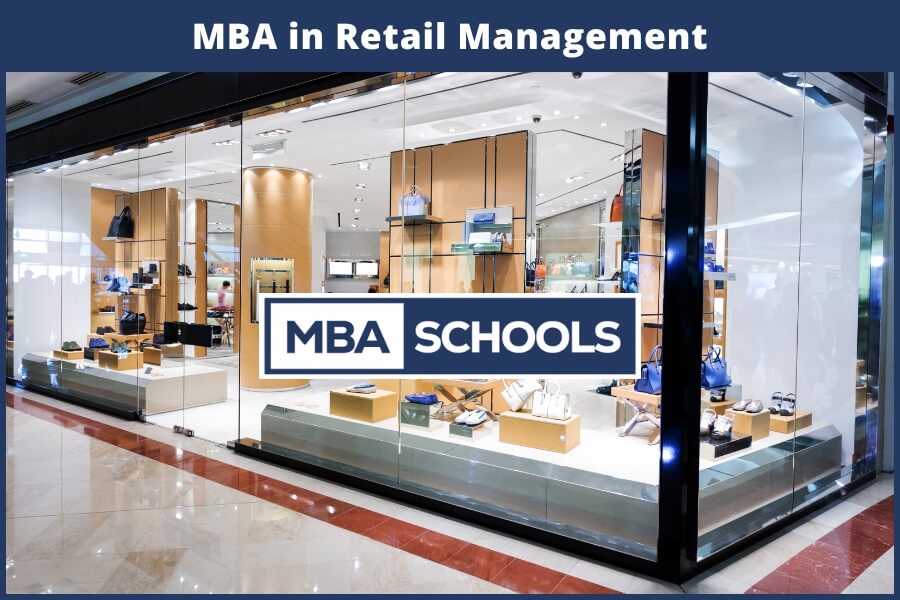MBA in Retail Management
An MBA in Retail Management is designed for professionals looking to lead retail businesses, optimize supply chains, and develop customer-driven marketing strategies. This specialization focuses on merchandising, e-commerce, consumer behavior, and brand management, equipping graduates with the expertise to manage retail operations, product distribution, and digital transformation in the retail industry.
According to the U.S. Bureau of Labor Statistics (BLS), employment in retail management roles is expected to remain strong as consumer demand shifts toward e-commerce and omnichannel retailing. Additionally, the median salary for retail managers is $130,000, reflecting the growing need for strategic leadership in retail operations ( BLS). A report by McKinsey & Company predicts that retail businesses leveraging data-driven marketing and AI-enhanced supply chains will see a 30% boost in profitability by 2030, highlighting the increasing demand for tech-savvy retail managers ( McKinsey).
An MBA in Retail Management specialization is ideal for professionals seeking to lead retail organizations, enhance brand performance, and drive consumer engagement in a competitive marketplace.
Find out more about MBA degrees.

Table of Contents
What is an Online MBA in Retail Management?
An Online MBA in Retail Management provides a flexible pathway for professionals looking to develop expertise in consumer trends, retail analytics, and business strategy while maintaining their careers. These programs focus on merchandising, digital retailing, and operations management, helping students prepare for leadership roles in retail corporations, e-commerce platforms, and global supply chains.
Students gain expertise in customer relationship management (CRM), inventory optimization, and pricing strategies, ensuring they can enhance customer experiences and drive profitability. Many online programs include real-world retail case studies, store management simulations, and omnichannel marketing projects, providing an immersive learning experience.
What Are the Admissions Requirements for an MBA in Retail Management?
Admissions requirements for an MBA in Retail Management vary by program but typically include the following:
- Bachelor’s Degree – From an accredited institution, often a Bachelor of Business Administration or a bachelor’s in marketing, supply chain, or a related field.
- Work Experience – 2-5 years of professional experience in retail, e-commerce, or business management is preferred.
- GMAT/GRE Scores – Some programs require standardized test scores, while others offer waivers.
- Personal Statement – Discussing career goals and why the applicant is pursuing an MBA in Retail Management.
- Letters of Recommendation – Typically from employers, retail executives, or academic mentors.
- Resume – Highlighting experience in retail operations, sales management, or marketing strategy.
Is an MBA in Retail Management the Right Specialization for You?
An MBA in Retail Management specialization is best suited for strategic thinkers customer-focused professionals interested in business innovation. If you are passionate about brand development, retail technology, and supply chain management, this specialization will provide the necessary skills for career advancement.
Unlike other MBA specializations, such as Marketing or Supply Chain Management, an MBA in Retail Management focuses on retail operations, e-commerce growth, and consumer engagement. If you want to lead global retail brands, optimize digital storefronts, or drive in-store sales growth, this program may best fit you.
MBA in Retail Management Curriculum: What Classes Will I Take?
Most MBA in Retail Management programs take 1-2 years to complete, depending on whether students enroll full-time, part-time, or in an accelerated format.
Core Courses in an MBA in Retail Management
The curriculum for a Retail Management MBA specialization blends business strategy with retail industry expertise through courses such as:
- Consumer Behavior & Retail Analytics
- Retail Merchandising & Inventory Management
- Digital Marketing & E-Commerce Strategy
- Supply Chain Optimization in Retail
- Customer Relationship Management (CRM) & Loyalty Programs
- Omnichannel Retailing & Brand Management
- Retail Pricing Strategies & Profitability Models
- Global Retail Trends & Emerging Markets
Many programs also incorporate retail management projects, including real-world store optimization case studies, customer engagement strategies, and marketing campaign simulations. Some students complete internships with major retail brands, e-commerce companies, or fashion merchandising firms to gain hands-on experience before graduation.
What Career Options Do I Have with an MBA in Retail Management?
A Retail Management MBA specialization prepares graduates for retail operations, e-commerce, and brand strategy leadership roles. Standard job titles include:
- Retail Operations Manager – Manages retail store performance, staffing, and profitability.
- E-Commerce Director – Oversees online sales channels and digital marketing strategies.
- Retail Brand Manager – Develops and implements brand positioning and promotional campaigns.
- Supply Chain & Logistics Director – Optimizes product distribution and inventory management.
- Customer Experience & Loyalty Program Manager – Enhances customer engagement and brand loyalty initiatives.
Salary Expectations
Salaries for MBA in Retail Management graduates vary based on industry, experience, and expertise. According to BLS and McKinsey, retail professionals with an MBA typically earn:
- Retail Operations Manager – $100,000 – $150,000
- E-Commerce Director – $120,000 – $180,000
- Retail Brand Manager – $110,000 – $160,000
- Supply Chain & Logistics Director – $130,000 – $190,000
- Customer Experience & Loyalty Program Manager – $105,000 – $155,000
Take the Next Step Toward a Leadership Role in Retail Management
An MBA in Retail Management provides the expertise needed to optimize retail operations, drive e-commerce success, and enhance brand strategy. Whether you want to lead global retail chains, develop data-driven marketing campaigns, or transform the digital shopping experience, this degree will give you the knowledge, skills, and network to achieve your career goals.
Explore top-ranked MBA in Retail Management programs today and start advancing your career.
Sources
- U.S. Bureau of Labor Statistics. (2023). Occupational Outlook Handbook: Retail & E-Commerce Management Careers. Retrieved from https://www.bls.gov/
- McKinsey & Company. (2023). Retail Industry Digital Transformation Report. Retrieved from https://www.mckinsey.com/